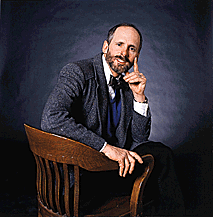

Although many colleagues find his dedication to this course remarkable, Steiner himself doesn't think so.
"I love teaching undergraduates," says the 1996 Distinguished Teaching Award winner. "I really enjoy their joyful enthusiasm and their wide interest in things. There's nothing I like more than to go into the biology labs and work with a few students one-on-one on a problem."
Steiner, who is internationally known as a researcher in reproductive endocrinology, author of more than 100 scientific papers, and a textbook editor in physiology, says he enjoys teaching at all levels--from undergraduate to postdoctoral. "I find the differences stimulating," he says. In addition to teaching general biology, he also teaches human reproduction for medical students and neuroendocrinology for graduate students.
"I think there's a tendency, especially for senior researchers, to just concentrate on the very specialized area of their research, but I find it useful to try to keep the bigger picture in mind."
As a science teacher, Steiner is known for a certain philosophical and poetic bent, and he often begins a presentation with a poem or reading. Students new to his classes, he says, often have the reaction: "What is with this guy?"
"Dr. Steiner left me dumbfounded when he began class by reading a poem about watching a red-tailed hawk glide across a snow-covered field," says one student. "This was not the kind of science lecture I was used to! I appreciated that poem, and I believe Dr. Steiner made his point: Biology is the science of life, and it concerns life outside of the lab, outside of the lecture hall, as well as in these places."
"Ultimately," Steiner says, "I look at the study of science as a human experience. We humans bring our emotions, and ourselves, to the study of science and I think it's important to keep that perspective in mind."
Over the years he has taught, he's given a lot of thought to what can be accomplished in the classroom and to the limitations on what can be achieved. Most learning, he believes, takes place when a student is personally engaged with the ideas and material. For this process, Steiner is willing to use poems, vignettes, antics--whatever works.
"I think it's a real privilege to teach at this great University," he says, "And I see my role like that of a tour guide to a wonderful place. I'm planning the trip, but then I also get to go along. "
Steiner came to the UW in 1975 after earning a Ph.D. in physiology at the Oregon Health Sciences Center in Portland. After a senior fellowship in physiology and biophysics, he became a faculty member with appointments in that department and in obstetrics and gynecology, as well as an adjunct appointment in zoology.
He is also a research affiliate of the Regional Primate Research Center and the Diabetes Research Center, and co-director of the Population Center for Research in Reproduction, as well as director of the Reproductive Biology Training Program.--Claire Dietz, Health Sciences News and Community Relations
Send a letter to the editor at columns@u.washington.edu.
Return to Best of 1996 Home Page